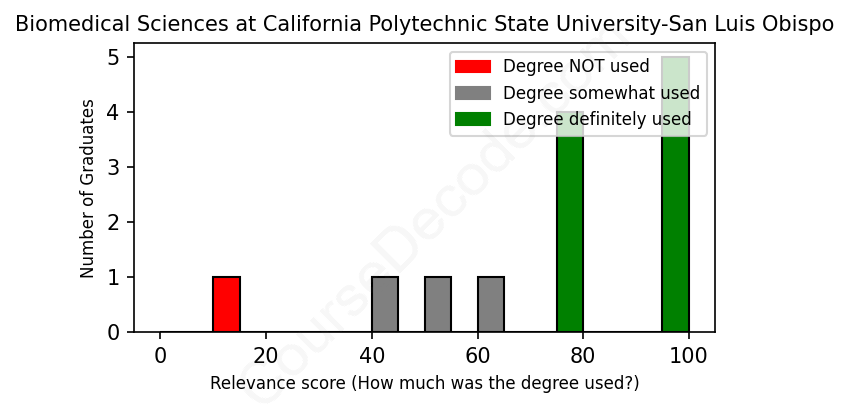
First, some facts. Of the Biomedical Sciences graduates from California Polytechnic State University-San Luis Obispo we've analyzed , here's how many have used (or NOT used) their degree in their career:

These are estimates based on AI analysis of 13 LinkedIn profiles (see below).
The verdict? Above average. Overall, with an average relevance score of 74%, Biomedical Sciences graduates from California Polytechnic State University-San Luis Obispo have a higher likelihood (+7%) of finding work in this field compared to the average graduate across all fields:
And for comparison, here's the chart for all profiles we've looked at across all degrees.
Also, after graduating, 46% of these graduates have pursued further education other than another Bachelor's degree (such as a Masters degree or other), compared to the average across all profiles of 35%. This suggests you may need more than just a Bachelors degree to be competitive as a Biomedical Sciences graduate.
See the details:
|
Relevance score: 77% We think this person has gone into a career highly relevant to their degree. We think this person has gone into a career highly relevant to their degree.
DEGREE INFOGraduated in 2014 from California Polytechnic State University-San Luis Obispo with a Bachelor of Science in Biomedical Sciences. Also pursued further education since (see below). JOB HISTORY SINCE GRADUATIONHead Engineer Cytoflow Jan 2014 - Nov 2015 Contract Mechanical Engineer  Inpress Technologies Apr 2014 - Jan 2016 Engineer  Amgen Jan 2016 - Jan 2017 Senior Engineer  Amgen Jan 2017 - Oct 2018 Senior Mechanical Engineer  Owl biomedical, Inc. Oct 2018 - Present Senior Mechanical Engineer  Miltenyi Biotec Oct 2018 - Present FURTHER DEGREES DONE SINCE GRADUATINGMaster's degreeCal Poly San Luis Obispo 2014 - 2015 ABOUTAdaptability | Analytical | Relator | Competitive | Restorative |
The top 10 most common jobs done by the graduates we've analyzed (ranked most common to least) are:
Looking at the jobs people with a Biomedical Sciences degree from California Polytechnic State University-San Luis Obispo have taken on, it seems like there’s a bit of a split between roles that are directly related to biomedical sciences and those that aren't. A lot of graduates seem to end up in engineering or technical-related positions, like manufacturing engineer roles or various levels of engineering at companies like Amgen and Arthrex. While these jobs might use some skills or principles that overlap with biomedical sciences, they often lean more towards engineering or management skills rather than applying the specific knowledge gained from their degree. For example, roles in sales or project management at medical companies are common too, but they usually focus more on business strategy than biomedical concepts.
On the flip side, there are also a good number of graduates who do engage in roles that are highly relevant to biomedical sciences, particularly in research and development positions like those at Alphatec Spine or CIRM. These roles often allow them to dive deep into biomedical applications, making it clear they’re using the core skills from their studies. It’s clear that while some graduates find ways to connect their degree to their jobs, many are in fields that don’t require a strong application of biomedical knowledge on a daily basis. So, in a nutshell, if someone is looking to stay closely aligned with their Biomedical Sciences education, they may need to seek out specific roles that emphasize research, biomedical engineering, or healthcare directly.
Here is a visual representation of the most common words in job titles for Biomedical Sciences graduates (this is across all Biomedical Sciences graduates we've analyzed, not just those who went to California Polytechnic State University-San Luis Obispo):

Based on the LinkedIn profiles of graduates from California Polytechnic State University-San Luis Obispo with degrees in Biomedical Sciences, it looks like many of them have embarked on solid career paths that are often aligned with their field of study. For their first jobs after graduation, many individuals have secured positions such as engineering roles, project management positions, or even launching their own ventures. For example, one graduate co-founded a company and has been working as a Principal Investigator, while others entered reputable companies in the medical and engineering sectors like Arthrex and Amgen, often taking on positions that involve product management or engineering.
As time goes on, typically five to ten years after graduation, these professionals seem to transition into more senior and specialized roles. Many have moved up to senior engineering positions or leadership roles in product development and management. Some have even ventured into unique roles such as Medical Scribe or research positions, which reflect a dedication to remaining in the biomedical or healthcare spheres. While there are a few paths that may have stepped away from strictly related biomedical careers, the overall trajectory for these graduates appears quite positive, suggesting that a degree in Biomedical Sciences from Cal Poly can lead to successful and relevant careers in the field.
Honestly, a Bachelor’s degree in Biomedical Sciences at Cal Poly San Luis Obispo is pretty challenging, like a solid mix of science and problem-solving that’ll keep you on your toes. You’re diving into some heavy subjects like biology, chemistry, and anatomy, which can be intense if you’re not super into that stuff. Plus, the hands-on lab work can be time-consuming, and balancing it all with studying can feel like a juggling act sometimes. It’s definitely rigorous, but if you’ve got a passion for the sciences and are willing to put in the effort, it can also be super rewarding. Just be ready to tackle some tough material and hustle a bit!
Most commonly, in the LinkedIn profiles we've looked at, it takes people 4 years to finish a Bachelor degree in Biomedical Sciences.
Looking at the career paths of these Biomedical Sciences graduates from California Polytechnic State University-San Luis Obispo, it seems like a lot of them are doing quite well financially, especially those who graduated earlier. For instance, the grad from 2010 climbed the ladder quickly in a reputable company and moved on to roles like Senior Associate, which typically pays well. The ones who co-founded their own companies or took senior engineering positions at big-time firms like Amgen are likely raking in decent salaries too. Even the newer grads, like the ones who went into engineering at places like Keysight Technologies and SpaceX, are stepping into high-demand jobs that generally offer good pay. So, overall, it seems like making a degree from Cal Poly is a solid investment if you’re aiming for a good financial future!
Here is a visual representation of the most common words seen in the "about" section of LinkedIn profiles who have a Bachelor degree in Biomedical Sciences (this is across all Biomedical Sciences graduates we've analyzed, not just those who went to California Polytechnic State University-San Luis Obispo). This may or may not be useful:

Here are all colleges offering a Bachelor degree in Biomedical Sciences (ordered by the average relevance score of their Biomedical Sciences graduates, best to worst) where we have analyzed at least 10 of their graduates:
| College | Score | Count |
|---|---|---|
 Western Michigan University Western Michigan University
|
81 | 17 |
 Marquette University Marquette University
|
78 | 29 |
 University of Michigan University of Michigan
|
77 | 10 |
 Colorado State University Colorado State University
|
77 | 19 |
 University at Buffalo University at Buffalo
|
75 | 18 |
 California Polytechnic State University-San Luis Obispo California Polytechnic State University-San Luis Obispo
|
74 | 13 |
 University of Connecticut University of Connecticut
|
74 | 15 |
 Texas A&M University Texas A&M University
|
73 | 59 |
 Auburn University Auburn University
|
71 | 26 |
 Northern Arizona University Northern Arizona University
|
71 | 15 |
 Rensselaer Polytechnic Institute Rensselaer Polytechnic Institute
|
70 | 10 |
 University of Central Florida University of Central Florida
|
69 | 26 |
 University of South Florida University of South Florida
|
68 | 48 |
 Georgia Institute of Technology Georgia Institute of Technology
|
67 | 41 |
 The Ohio State University The Ohio State University
|
64 | 14 |
 Rochester Institute of Technology Rochester Institute of Technology
|
64 | 12 |
 Case Western Reserve University Case Western Reserve University
|
63 | 12 |
 Grand Valley State University Grand Valley State University
|
59 | 35 |
 Arizona State University Arizona State University
|
58 | 12 |